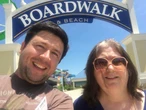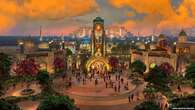Rain-parched Southern California finally received some much-needed precipitation recently, offering some relief from the Los Angeles wildfires which displaced more than 150,000 people from their homes—and either razed or damaged some 15,000 structures. Of course, not everyone jumped to help. But amid the widespread devastation came what seems like, in our socially and politically fraught times, an unlikely ray of hope: A convergence of communities, of neighbors helping each other in whatever way possible and even heading out to assist complete strangers.
The goodwill and altruism born from this calamity has been a boon to exhausted and overwhelmed firefighters and public resources. But why does it seem to take epic disasters to bring people together in the first place?
Social behavior and trauma
Psychological research provides fascinating insights into that very question. One particularly influential paper published in the American Journal of Orthopsychiatry in 2008 dubs this phenomenon of charity and communal support “altruism born of suffering.”
“Research on altruism has focused on its positive roots, whereas research on the effects of victimization and suffering has focused on aggression and difficulties in functioning,” write the study authors. “However, anecdotal evidence, case studies, and some empirical research indicate that victimization and suffering can also lead people to care about and help others.”
One of the paper’s authors, prominent psychologist and professor emeritus Ervin Staub at UMass Amherst, has expounded on his findings in the years since, noting the real-world evidence from studies of people’s social behavior following a traumatic event, such as the 2004’s devastating earthquake and tsunami in the Indian Ocean.
“In one study, some participants reported that they have suffered because of abuse or violence against them in their families, because of harmful behavior against them as members of a group, or because of natural disasters,” Staub wrote in Psychology Today. “Months later they expressed more empathy with, and feelings of responsibility for helping people affected by the tsunami in Asia in 2004, and volunteered more to collect donations for them, than people who reported that they had not suffered. They also volunteered more for causes that involved helping people.”
Tightening communities
A trio of experts who spoke with Fast Company added further context to the social psychology of collective trauma events, group identity during times of disaster, and community cohesion after mass tragedies which helps explain this sudden impulse toward altruism and empathy.
“There are place communities like we had in Altadena, and that’s very meaningful, and it’s not something that everyone has. But there are also these other kinds of communities of identity, you know, like people will say, I belong to the gay community, or I belong to the community around a particular organization,” says John Brekke, professor emeritus at the USC School of Social Work—and, incidentally, an Altadena resident whose own home was greatly damaged by the recent wildfires.
“So, you know, it’s interesting when you see people who all of a sudden come together around this almost community of disaster, in a way, they feel themselves. They can be a part of something by participating in this community of helpers, really, either through giving money or lending time or actually taking people in, and that act of giving at the community level seems to be as meaningful as literally giving to someone that you’re right next to who needs some help.”
There’s a neurobiological aspect to this, too, Brekke says, explaining that, “it not only feels good from a spiritual point of view, if people are being spiritual, but it also feels good from a psycho-biological perspective, because you get a rush of great stuff into your system when you are being empathic and when you are giving to others.” This includes biochemical releases of things like serotonin and oxytocin, which lead to feelings of contentment, well-being, and connection.
Individualism and identity
Unfortunately, whether that feeling of empathy and good will persists after a collective traumatic event like the wildfires is a more complicated question. Some of that has to do with American societal values.
“American mainstream society is about rugged individualism,” says Jorja Leap, a professor of social welfare and executive director of the UCLA Social Justice Research Partnership. “Here you’re an individual, you’re taught. Whether it’s the frontier, whether it’s space travel, whether it’s running for office, we look at individual personality and individual strengths, and we tend to lift that up more than the idea of community, so people are expected to make it on their own.” So, while disasters such an earthquake or war may bring people together, there can be an ensuing cynicism, she adds. (Case in point: The ongoing battle over fire insurance and which communities’ houses will be rebuilt in Los Angeles.)
“We may be incredibly altruistic and responsive and then incredibly cynical, and sometimes that cynicism is self-protective. I really believe that cynicism is just cover up for fear,” adds Leap.
Another expert, Alison Holman, a professor at the UC Irvine School of Nursing and UCI’s School of Psychological Science, has extensive experience researching the effects of individual and collective traumas, including Southern California wildfires. Like USC’s Brekke, she believes identity is a key factor that drives empathy and altruism during crisis moments.
“What may be happening is that people identify, to some extent, with the people, the victims,” she says. “We have found in our work that identifying with victims is really something that helps to encourage people to engage in pro-social behavior. So, when people identify with them, meaning, ‘Oh my God, I lived there, I lived in that area,’ or, ‘Oh my God, I’ve lost my home,’ or, ‘Oh my God, I know what it’s like to be threatened by that,’ it may just instigate in people that sense of identification that would make them want to help out.”
That’s certainly a phenomenon playing out in Los Angeles at the moment. Whether it leads to lasting change in people and more community engagement after the blaze, and in an era where climate change is expected to lead to ever-cascading calamities, is a more open question.







No comments